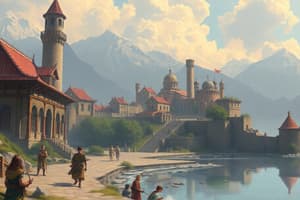Podcast
Questions and Answers
What characterizes the Medieval period in Europe?
What characterizes the Medieval period in Europe?
- The dominance of monarchies with no external influences.
- An era marked solely by scientific advancements.
- A complete absence of trade and cultural exchange.
- The rise of feudalism and the influence of the Catholic Church. (correct)
Which method is NOT typically used in historical study?
Which method is NOT typically used in historical study?
- Astrophysical analysis (correct)
- Contextualization
- Source criticism
- Oral history
What was a significant outcome of the Early Modern period?
What was a significant outcome of the Early Modern period?
- The establishment of the first democratic governments.
- The rise of nation-states and new forms of governance. (correct)
- The decline of cultural and intellectual exploration.
- Complete political stability across Europe.
Which civilization is credited with major advancements in philosophy, mathematics, and architecture?
Which civilization is credited with major advancements in philosophy, mathematics, and architecture?
What does prehistory primarily rely on for understanding early human societies?
What does prehistory primarily rely on for understanding early human societies?
How do historical interpretations change over time?
How do historical interpretations change over time?
What was one of the major transformations during the Modern period?
What was one of the major transformations during the Modern period?
What role does critical thinking play in historical study?
What role does critical thinking play in historical study?
Flashcards
Prehistory
Prehistory
The period before written records, studied primarily through archaeology.
Ancient Civilizations
Ancient Civilizations
Complex societies like Egyptians, Mesopotamians, Greeks, and Romans, shaping modern world.
Medieval Period
Medieval Period
Time in Europe (5th-15th centuries), marked by feudalism and the Church's influence.
Early Modern Period
Early Modern Period
Signup and view all the flashcards
Modern Period
Modern Period
Signup and view all the flashcards
Historical Methodology
Historical Methodology
Signup and view all the flashcards
Historical Interpretation
Historical Interpretation
Signup and view all the flashcards
Historical Study
Historical Study
Signup and view all the flashcards
Study Notes
Historical Periods
- History encompasses the entirety of past events and human experiences.
- Historical study employs various methods to interpret and understand the past, including analyzing written documents, artifacts, and oral traditions.
- Historians employ critical thinking to evaluate the accuracy and validity of sources.
Prehistory
- Prehistory refers to the period before written records.
- Archaeological evidence, like tools and remains, is crucial in understanding this era.
- Prehistory encompasses the development of early human societies and cultures.
Ancient Civilizations
- Ancient civilizations, such as the Egyptians, Mesopotamians, Greeks, and Romans, developed complex social structures, political systems, and cultural traditions.
- These civilizations laid the foundations for many aspects of modern society.
- Their advancements in literacy, architecture, mathematics, and philosophy revolutionized the human experience.
Medieval Period
- The Medieval period, often associated with the Middle Ages, encompassed Europe from the 5th to the 15th centuries.
- Various kingdoms and empires existed during this time, marked by the rise of feudalism and the influence of the Catholic Church.
- Key events, such as the Crusades and the Black Death, significantly impacted medieval societies.
Early Modern Period
- The Early Modern period, bridging the medieval and modern eras, saw significant transformations in Europe's political and social landscape.
- Exploration, the Renaissance, and the Reformation were defining characteristics of this epoch.
- The rise of nation-states and new forms of governance marked this era.
Modern Period
- The modern period encompasses the era from the 18th century to the present.
- Major events, including the Industrial Revolution, World Wars, and the rise of globalization, shaped the contemporary world.
- The 20th and 21st centuries saw ongoing shifts in global politics, economics, and society.
Historical Methodology
- Historians employ various methodologies, including source criticism, contextualization, and interpretation, to understand past events.
- The selection and analysis of primary and secondary sources are crucial in historical research.
- Historians strive for objectivity, but recognizing subjective biases in accounts and interpretations is important.
Historical Interpretations
- Historical interpretations evolve over time, influenced by changing perspectives and new discoveries.
- Different schools of thought and theoretical frameworks shape how historians understand and analyze the past.
- The past is never static; new understandings contribute to a more complex and nuanced picture.
Studying That Suits You
Use AI to generate personalized quizzes and flashcards to suit your learning preferences.




